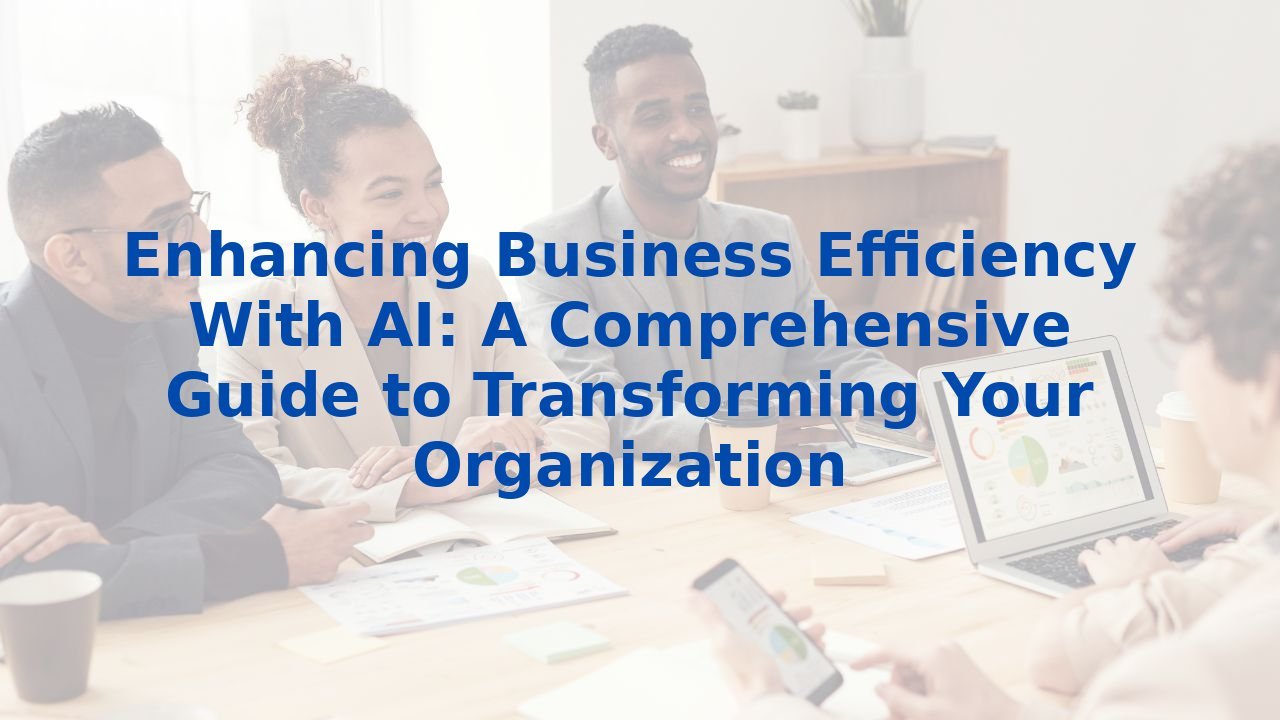Enhancing Business Efficiency With AI: A Comprehensive Guide to Transforming Your Organization
Enhancing Business Efficiency With AI: A Comprehensive Guide to Transforming Your Organization
Introduction
In an era defined by rapid technological advancement, organizations find themselves in a continuous race toward achieving operational excellence. The key player in this journey is none other than Artificial Intelligence (AI), a powerful ally that helps businesses automate routine tasks, refine decision-making processes, and optimize overall efficiency. In this guide, we'll explore the transformative potential of AI in enhancing various business processes and share insights on the importance of employee training in harnessing its full capabilities.
What is AI Process Optimization?
AI process optimization encompasses the use of AI and machine learning to improve business process management. This approach involves analyzing existing data, automating repetitive tasks, and empowering team members to make informed decisions. The primary objective? To minimize errors, boost productivity, and elevate operational efficiency—an endeavor that every organization aims to achieve.
Key Benefits of AI in Business Process Management
Understanding the myriad of benefits AI can bring to your business processes can be a game-changer. Here are some core advantages:
Process Discovery and Mapping: AI technologies such as process mining and pattern recognition reveal how a company operates. By creating accurate process maps, businesses can keep documentation up-to-date and minimize discrepancies.
Process Automation: By utilizing AI bots, organizations can streamline tasks once performed manually, such as data entry and document processing. Intelligent Document Processing (IDP) is a standout example, transforming documents into actionable data autonomously.
Continuous Improvement: AI fosters a culture of continuous improvement by supplying feedback and performance insights. This iterative mechanism enables businesses to refine their BPM strategies in line with evolving objectives and industry standards.
Data Analysis and Visualization: With the capability to process vast amounts of data quickly, AI can unveil trends and predict outcomes. This analytical prowess equips organizations to make strategic decisions with confidence.
Real-Time Monitoring and Risk Prediction: AI's real-time monitoring capabilities allow companies to detect anomalies and deviations in processes. This proactive approach means potential issues can be addressed before they escalate.
Practical Applications of AI in Business Processes
Seeing is believing. Here are tangible applications illustrating AI's role in enhancing business processes:
- Document Processing: Automating the processing of purchase orders and invoices reduces the burden of manual data entry, saving time and minimizing errors.
- Customer Service: AI-driven analytics enhance customer service operations by dissecting customer feedback and funneling information into ticketing systems. Meanwhile, chatbots handle basic inquiries, significantly elevating the customer experience.
- Sales and Marketing: Customer relationship management (CRM) solutions enhanced by AI predict revenue-generating potentials while chatbots provide instant customer solutions—accelerating sales and expanding audience reach.
- Human Resources: AI enhances objectivity in HR practices, streamlining administrative tasks and providing insights into employee attrition trends.
The Role of Training in AI Implementation
While AI offers immense benefits, maximizing its potential relies heavily on equipping employees with the right skills through comprehensive training.
Enhanced Skills: Training programs tailor-made for AI enable employees to grasp the technology's applications across various processes. This understanding is crucial for identifying optimal integration points.
Better Decision-Making: Well-trained employees leverage the insights generated by AI to make informed decisions. By interpreting data-driven recommendations, they can actively contribute to a climate of continuous improvement.
Adaptability: Employees trained in AI are poised to embrace change. Their familiarity with AI tools ensures agility and responsiveness to evolving business landscapes.
Conclusion
The landscape of business efficiency is being reshaped through the lens of AI. This transformative technology enables organizations to automate mundane operations, elevate decision-making processes, and streamline internal workflows. By embracing AI for data analysis and process optimization, businesses can enhance productivity, trim costs, and bolster customer satisfaction.
Moreover, investing in employee training on AI is not merely advantageous—it's essential. Only through the development of skills around AI can organizations hope to maximize their competitive edge in the dynamic business environment we live in. To embark on this journey, consider a tailored training approach for your workforce to harness the full potential of AI and revolutionize your organizational processes.



